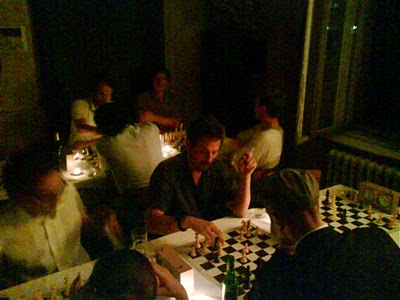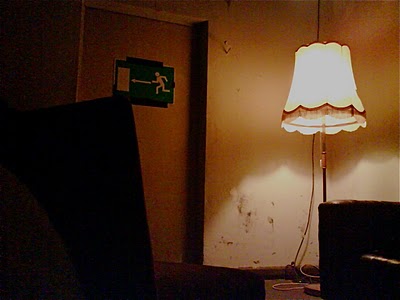
It’s an abandoned brewery. You enter a gate, a waif-like woman lit by candlelight admits you, but gives no directions. You find yourself in a yard with a hundred parked bikes but no people. Lamps do little to up-light the darkened buildings. There’s hesitation, you try a few doors, they’re all locked. But you hear music, perhaps the static of conversation, and you divine the right stairwell. It’s broken down, it’s very dry. The walls are cracked, pipes broken, but nothing oozes out. Precarious, it could suddenly splinter into dust.
You ascend, absorbed in the electronic beat, the low hum of voices under, somewhere up in that darkness. A landing too quickly brings you to the room and crowd, a rush of life, like a colony of succulents in the desert. They are an odd lot: arty types under the vaulted ceilings, or along the long bar. A woman passes clothed entirely in small straps.
The light is feeble, most of it comes from a standing lamp in the corner, the drinkers are all now tenebrae under the reflections of a disco ball, like an ersatz moon. You walk right up to the window, and see the view through the glass to the television tower, its globe like the promise of a false future. The vibrations somehow resuscitate the building, like the music has restored a heartbeat.
You cross the landing again, into a crowded passage. Push through, there’s a kitchen, they’re eating pasta from a communal pot. And then further on, there’s the surprise: a room with long tables laid out methodically with chess sets, speed clocks, and intent players. A man deliberates, moves his pawn, and strikes to stop the clock.

This sudden blaze of creativity behind unmarked doors does not surprise me. You can still find plenty of parties using informal industrial spaces in Berlin, ones that understand that sublime pleasure is more likely to come from the unexpected than the comfortable and orderly. What surprises me is that this party is in Prenzlauer Berg, a neighbourhood that I thought had been thoroughly gentrified by nuclear families from the South of Germany. The appearance of the television tower, at such close proximity through the windows, seems like it should be a cliché, an allusion to an irretrievable moment, the depiction of how it once was before this part of East Berlin was regulated. This is 1992 in film, not 2010 in person –except maybe for tourists doing a package tour of the Tacheles.
But this is no squat, this little piece of old East Berlin is in fact for rent, that’s how the Sparwasser HQ Arts Offensive and the chess club Night of the Pawn obtained this brilliant space for their parties. The magic, however, is only ruined a little: the Bötzow Brauerei looks and feels like a moment from the past, with all the requisite stains in the walls and creaks in the floorboards, and local crowd. It is an opportunity for nostalgia, a revisiting of a Prenzlauer Berg world since gone by, and escape from the luxury apartments, theme restaurants and that other Bötzow Brauerei, the Kulturbrauerei, now a sanitised mass entertainment complex with chain cinema.
I could not stay very long. It was all too sad. What was the point of lingering, absorbing the old feeling? Somewhere, early on, there was a missed move, a problem of strategy, and since then too much time has passed on the clock.
View Larger Map




